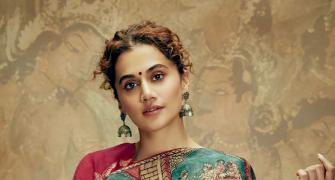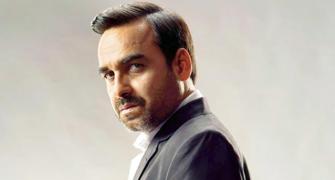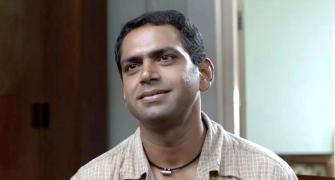'While men are brought up to be more vocal, women are taught to be more silent, resilient and self sacrificing.'
'We have tried to explore this.'

Writer Apurva Asrani is all set to entertain us with the second season of Criminal Justice, Criminal Justice: Behind Closed Doors.
"While Season 1 was about the boys, Season 2 is about the girls," he says, referring to Vikram Massey, Pankaj Tripathi and Jackie Shroff in the first season.
The second season sees Pankaj Tripathi return with an all-women cast in Kirti Kulhari, Deepti Naval, Mita Vashisht and Shilpa Shukla.
Apurva tries to analyse the content on the OTT platform and explains to Subhash K Jha, "There is a clear demarcation now. The potential money spinners, the star vehicles go to the cinemas while the darker stories, the slow burns, the realistic stories go to OTT."
Sridhar Raghavan wrote the first season of the Web series, Criminal Justice. Now you have written Season 2. How do you compare Season 2 with Season 1?
I really enjoyed Season 1.
It had terrific performances, especially from Pankaj Tripathi, Vikrant Massey and Jackie Shroff.
It dealt with how someone can get caught in the mechanics of the justice system.
While this is the recurring theme of the series, the similarity ends there.
While Season 1 was about the boys, Season 2 is about the girls.
In what sense?
Season 2 is more feminine.
Our story is populated with interesting women characters and it explores their position in our homes and our society at large.
While men are brought up to be more vocal, women are taught to be more silent, resilient and self sacrificing.
We have tried to explore this.

Criminal Justice is adapted from the BBC serial of the same name. Tell us about your adaptation process.
The process of adaptation has been a very interesting exercise.
The first season was an adaptation of The Night Of that had no sequel.
So the adapted characters like Madhav Mishra (Tripathi) and Nikhat (Anupriya Goenka) needed to take off into their own universes in Season 2. This had no precedent.
Plus, we were adapting Peter Moffat's Criminal Justice story into the Indian context, while adding our the Season 1's characters to it.
How challenging was this process?
When I met Sameer Nair (CEO, Applause Entertainment) for the first time, his excitement to pull something as complex as this off was very palpable.
I was taken up by his passion and took it as a challenge to deliver to his vision.
I think we, as a team, went beyond that vision when we created powerful new characters that had nothing to do with the adaptations.
So in essence Season 2, entitled Criminal Justice: Behind Closed Doors, is the amalgamation of three different universes into one story.

How relevant has the digital space become during the past one year?
I got a taste of the digital space when I worked on Made In Heaven as an editor.
What I found most attractive was how they wrote that show.
Even the smallest characters, that might have been sidelined in a movie, had a compelling story.
The sub-plots were given importance.
The nuances were brought to the fore.
The series space allows for more depth in the exploration of the human condition.
It's a treat for any writer.
The digital allows for all kinds of storytellers to become stars.
Theatrical, albeit a powerful medium, favours the mainstream film-maker; the one that knows the language of the proverbial 'front bencher'.
While this skill is laudable, it can push the more serious storytellers to the sidelines.
The success of digital content like Paatal Lok, Panchayat, Scam 1992 and Asur indicate that the more serious film-makers are finally at the forefront.
There is a lot of conflict between the OTT platform and movie theatres.
I think this churning in 2020 has been for the good.
When Hansal Mehta made Shahid, which I co-wrote, and Aligarh, which I wrote, and we saw 12 people in the cinema hall, it felt like we were outsiders in that space.
Our films were quickly taken off the theatres to accommodate a potential hit.
Now the same director makes a Scam 1992 for an OTT platform and it's a big hit.
Hansal is tasting stardom that has eluded him in his 25-year career in the movies.
So in a nutshell, there is a clear demarcation now.
The potential money spinners, the star vehicles go to the cinemas while the darker stories, the slow burns, the realistic stories go to OTT.

Don't you think the excessive abuse and luridness in some Web series is unnecessary?
I don't think anything is unnecessary.
The digital space has room for all kinds of storytellers and all kinds of audiences.
I like to create content that a whole family can experience collectively.
I am fortunate to have found collaborators in artists like Hansal Mehta, Zoya Akhtar and Sameer Nair who think like me.
I remember in the mid 2000s, when satellite TV had exploded with Kaanta Laga type of videos featuring objectified women, I made Tera Mera Pyar for Sony Music.
It was a gentle, lilting story of a girl (Nimrat Kaur) and a boy coyly meeting in a cinema hall.
It became a big hit.
I understood that all kinds of audiences exist.
That video is popular even today. It has stood the test of time.
Besides Criminal Justice, what else do you have lined up?
I have a drama series with paranormal elements that I'm about to start work on.
Then there is the film with Manoj Bajpayee that I'm eager to direct.
It got pushed by the lockdown and this time has forced us to revisit it and work harder on the script.
As a gay film-maker, what do you think of the depiction of homosexuality in our cinema?
It an important question and a common mistake society makes.
I'm glad you asked it like that.
I am not a gay film-maker.
I am a film-maker with various facets to my personality, one of which happens to be that I'm in a committed relationship with another man.
I think our films have really matured in their depiction of homosexual characters.
I loved the cop in Aarya who happens to be gay.
So subtly done.
I think we have a long way to go, and some mistakes will be made, but we need to be kinder to the ones that try and not shame them for getting it wrong.










